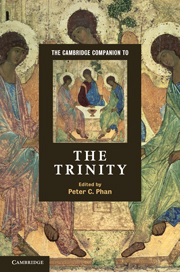Book contents
- Frontmatter
- Contents
- Notes on contributors
- Preface
- Part I Introduction
- Part II Retrieving the sources
- Part III Renewing the tradition
- Part IV Contemporary theologians
- 10 Karl Barth, reconciliation, and the Triune God
- 11 Mystery of grace and salvation: Karl Rahner's theology of the Trinity
- 12 Hans Urs von Balthasar on the Trinity
- 13 The trinitarian doctrines of Jürgen Moltmann and Wolfhart Pannenberg in the context of contemporary discussion
- 14 Sophia, apophasis, and communion: the Trinity in contemporary Orthodox theology
- 15 The life-giving reality of God from black, Latin American, and US Hispanic theological perspectives
- 16 Feminist theologies and the Trinity
- Part V In dialogue with other religions
- Part VI Systematic connections
- Index
- References
12 - Hans Urs von Balthasar on the Trinity
from Part IV - Contemporary theologians
Published online by Cambridge University Press: 28 July 2011
- Frontmatter
- Contents
- Notes on contributors
- Preface
- Part I Introduction
- Part II Retrieving the sources
- Part III Renewing the tradition
- Part IV Contemporary theologians
- 10 Karl Barth, reconciliation, and the Triune God
- 11 Mystery of grace and salvation: Karl Rahner's theology of the Trinity
- 12 Hans Urs von Balthasar on the Trinity
- 13 The trinitarian doctrines of Jürgen Moltmann and Wolfhart Pannenberg in the context of contemporary discussion
- 14 Sophia, apophasis, and communion: the Trinity in contemporary Orthodox theology
- 15 The life-giving reality of God from black, Latin American, and US Hispanic theological perspectives
- 16 Feminist theologies and the Trinity
- Part V In dialogue with other religions
- Part VI Systematic connections
- Index
- References
Summary
One of the striking aspects of Hans Urs von Balthasar's work is the integration of his reflections on the Trinity – on the eternal, inner life of the Trinity, in particular – into the fabric of his thought as a whole. A good deal of recent theology has been preoccupied with the question of what to do with the Trinity: how to make clear the relevance of a doctrine which surely ought to be central, but which, with its “substance” and hypostasis, its “processions” and “relations,” can seem like nothing but a series of technicalities and intellectual difficulties. In the context of Balthasar's theology, such questions simply do not need to be raised. One finds in his work, that is to say, both a very vivid depiction of the inner life of the Trinity and one which is genuinely integral to his presentation of the story of salvation. Whether ultimately he has the right to such a vivid picture of the eternal life of God is a question we shall ask below, as is also whether the integration he achieves requires too resolved a vision – too positive a vision, indeed – of suffering and evil. But we will begin by examining some of the ways in which Balthasar interweaves (to use the usual terms) economic and immanent Trinity.
mission christology and the trinity
In his “Outline of Christology” in the third volume of the Theodramatik (Theo-Drama), Balthasar highlights as the central, defining feature of Jesus’ existence his consciousness of mission. This, especially when coupled with an insistence on his absolute identification with this mission, allows for a striking integration of a reading of the life of Jesus with classic formulations of the Son's eternal procession from the Father.
- Type
- Chapter
- Information
- The Cambridge Companion to the Trinity , pp. 208 - 222Publisher: Cambridge University PressPrint publication year: 2011
References
- 1
- Cited by



